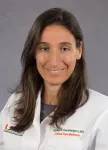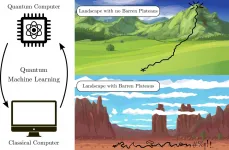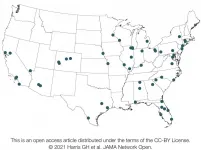(Press-News.org) PITTSBURGH, March 19, 2021 - Non-circulating memory T cells, whose main function is to provide local protection against re-infection, contribute to chronic transplant rejection, University of Pittsburgh School of Medicine researchers reveal in a paper published today in Science Immunology.
The scientists show that these "tissue-resident memory T cells" are harmful in situations where antigens that the cells recognize are present in the body for a long time, such as in cases of an organ or tissue transplant. This finding is an important step toward improving therapies to help prevent organ rejection in transplant recipients.
"Tissue-resident memory T cells serve an important surveillance function," said co-senior author Martin Oberbarnscheidt, M.D., Ph.D., assistant professor of surgery at Pitt. "If these cells encounter the same pathogen more than once, they can help quickly eliminate it. But studying these cells in transplants gives us a unique opportunity to look into what happens when the antigen persists--a new organ transplant is a big piece of tissue which, unlike an infection, stays in the body for a long time."
Immunologists and transplant surgeons have long been aware that T cells--a subset of immune cells central to the development of acquired immunity--play a critical role in acute rejection of a transplanted organ. But until now, the role of resident memory T cells in transplant rejection was overlooked.
"Resident memory T cells turn from being protective against an infection into a problem in a transplant setting as they fight off a life-saving organ," said lead author Khodor Abou-Daya, M.D., research assistant professor in Pitt's Department of Surgery. "It's an elephant in the room--T cells are present at a chronic stage of the kidney transplant rejection, but no one knew if these cells were functional."
Using a mouse model of kidney transplantation, the researchers showed that, over time, activated T cells that infiltrate a transplanted organ morph into resident memory T cells.
They discovered that if they surgically conjoin blood circulation of two mice, both of which received identical kidney transplants, memory T cells formed in transplanted organs don't travel from one mouse to the other. Similarly, if a transplanted kidney was then removed and re-transplanted again to yet another mouse, resident memory T cells stayed in the transplanted kidney and didn't disseminate anywhere else in the recipient's body, establishing that these cells reside in the tissue permanently.
It also is remarkable that, despite the presence of the ubiquitous antigen, these tissue-resident memory T cells didn't become "exhausted," as commonly happens to these T cells during chronic infections and in tumors. Instead, the cells remained functional, proliferating and producing signals that sustained a prolonged immune response. Moreover, their formation precipitated kidney graft rejection.
"There is an assumption that T cells in transplanted organs or tissues are exhausted and dysfunctional and may not contribute significantly to tissue rejection," said Abou-Daya. "Our work shows that tissue-resident memory T cells are functional and destructive."
Specifically targeting these cells could improve clinical transplant outcomes while preserving the immune system's ability to fight off infections, reducing the side effects of current systemic immunosuppressive therapies.
INFORMATION:
Other authors on the manuscript include Rayan Rammal, M.D., of the American University of Beirut, Lebanon; Roger Tieu, Daqiang Zhao, M.D., Faruk Sacirbegovic, Ph.D., Amanda Williams, M.S., and Warren Shlomchik, M.D., all of Pitt. Fadi Lakkis, M.D., of Pitt, is a co-senior author.
This work was supported by the National Institutes of Health (grants AI049466, AI145881, HL143349, AI074490, DK124925, GM008208, 1S10OD011925-01 and 1S10OD019942-01). It also was supported by the Ben J. Lipps Fellowship from the American Society of Nephrology and the Thomas E. Starzl Postdoctoral Fellowship in Transplantation Biology.
To read this release online or share it, visit https://www.upmc.com/media/news/031921-oberbarnscheidt-abou-daya [when embargo lifts].
About the University of Pittsburgh Schools of the Health Sciences
The University of Pittsburgh Schools of the Health Sciences include the schools of Medicine, Nursing, Dental Medicine, Pharmacy, Health and Rehabilitation Sciences and the Graduate School of Public Health. The schools serve as the academic partner to the UPMC (University of Pittsburgh Medical Center). Together, their combined mission is to train tomorrow's health care specialists and biomedical scientists, engage in groundbreaking research that will advance understanding of the causes and treatments of disease and participate in the delivery of outstanding patient care. Since 1998, Pitt and its affiliated university faculty have ranked among the top 10 educational institutions in grant support from the National Institutes of Health. For additional information about the Schools of the Health Sciences, please visit http://www.health.pitt.edu.
http://www.upmc.com/media
Contact: Anastasia Gorelova
Mobile: 412-491-9411
E-mail: GorelovaA@upmc.edu
Contact: Allison Hydzik
Mobile: 412-559-2431
E-mail: HydzikAM@upmc.edu
CAMBRIDGE, MA -- Many viruses infect their hosts through mucosal surfaces such as the lining of the respiratory tract. MIT researchers have now developed a vaccination strategy that can create an army of T cells that are ready and waiting at those surfaces, offering a quicker response to viral invaders.
The researchers showed that they could induce a strong memory T cell response in the lungs of mice by giving them a vaccine modified to bind to a protein naturally present in mucus. This can help ferry the vaccine across mucosal barriers, such as the lining of the lungs.
"In this paper, we specifically focused on T cell responses that would be useful against viruses or cancer, and our idea was to use this protein, albumin, as sort of a Trojan horse to ...
To understand the fundamental properties of an industrial solvent, chemists with the University of Cincinnati turned to a supercomputer.
UC chemistry professor and department head Thomas Beck and UC graduate student Andrew Eisenhart ran quantum simulations to understand glycerol carbonate, a compound used in biodiesel and as a common solvent.
They found that the simulation provided detail about hydrogen bonding in determining the structural and dynamic properties of the liquid that was missing from classical models. The study was published in the Journal of Physical Chemistry B.
Glycerol carbonate could be a more environmentally ...
During a public health crisis like the COVID-19 pandemic, U.S. hospitals need to allocate scarce medical resources in an equitable manner, according to clinicians and ethicists at the University of Miami Miller School of Medicine.
"Significant concerns have been raised that crisis standards of care may be biased against certain patients based on race or ethnicity," said Hayley Gershengorn, M.D., associate professor of pulmonary and critical care medicine. "To examine that issue, we analyzed over a thousand medical records from two academic hospitals where University of Miami faculty see patients and found no disparities ...
In-school COVID-19 transmission is rare - even among close school contacts of those who test positive for the virus - when schools heed public health precautions such as mandatory masking, social distancing and frequent hand-washing, according to results of a pilot study in Missouri aimed at identifying ways to keep elementary and secondary schools open and safe during the pandemic. A close contact is anyone who has been within 6 feet for more than 15 minutes in a 24-hour period with someone infected with COVID-19.
The study is part of a larger, ongoing collaboration involving the Centers for Disease Control and Prevention (CDC), Washington University School of Medicine in St. Louis, ...
LOS ALAMOS, N.M., March 19, 2021--Many machine learning algorithms on quantum computers suffer from the dreaded "barren plateau" of unsolvability, where they run into dead ends on optimization problems. This challenge had been relatively unstudied--until now. Rigorous theoretical work has established theorems that guarantee whether a given machine learning algorithm will work as it scales up on larger computers.
"The work solves a key problem of useability for quantum machine learning. We rigorously proved the conditions under which certain architectures of variational quantum algorithms will or will not have barren plateaus as they are scaled up," said Marco Cerezo, lead author on the paper published in Nature Communications ...
Notwithstanding last month's cold snap in Texas and Louisiana, climate change is leading to warmer winter weather throughout the southern U.S., creating a golden opportunity for many tropical plants and animals to move north, according to a new study appearing this week in the journal Global Change Biology.
Some of these species may be welcomed, such as sea turtles and the Florida manatee, which are expanding their ranges northward along the Atlantic Coast. Others, like the invasive Burmese python -- in the Florida Everglades, the largest measured 18 feet, end-to-end --maybe less so.
Equally unwelcome, and among the quickest to spread into warming areas, are ...
In light of recent extreme climate events--from wildfires blazing through the western US to snowstorms sweeping Texas into a blackout--climate scientists and media outlets have repeatedly called out the urgency of tackling the climate crisis. But in a new study published March 19 in the journal One Earth, researchers found that emphasizing urgency alone is not enough to kindle public support for climate change policies.
"We had the impression that policymakers shy away from enacting ambitious, stringent climate policy because they're afraid of ...
IIASA researchers worked with local stakeholders from the East African Community to explore and co-develop regional water scenarios that can enhance understanding of the up- and downstream water sector interactions in the extended Lake Victoria Basin to facilitate rational water resource planning.
East Africa is the world's fastest growing region outside of Asia, with an estimated growth of 5% and above over the last decade. Part of this success can likely be attributed to the East Africa Vision 2050, which was launched in 2015 by the Heads of States of the East African Community (EAC) - an intergovernmental organization composed of six countries in the African Great Lakes ...
PITTSBURGH, March 19, 2021 - A University of Pittsburgh School of Medicine-led survey of dozens of surge capacity managers at hospitals nationwide captures the U.S. health care system's pandemic preparedness status in the months before the first COVID-19 cases were identified in China.
Published today in the journal JAMA Network Open, the investigation details the strain experienced by U.S. hospitals during the 2017-18 influenza season, which was marked by severe illness and the highest infectious disease-related hospitalization rates in at least a decade. At the time, pandemic planning ...
A new research study at the University of Chicago Medicine has found that when it comes to COVID-19, having vitamin D levels above those traditionally considered sufficient may lower the risk of infection, especially for Black people.
The study, published March 19 in JAMA Open Network, retrospectively examined the relationship between vitamin D levels and likelihood of testing positive for COVID-19. While levels of 30 ng/ml or more are usually considered "sufficient," the authors found that Black individuals who had levels of 30 to 40 ng/ml had a 2.64 times higher risk of testing ...






